Vera Kittel
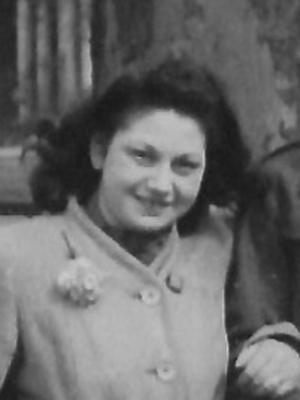
Born: Breslau, Germany (now Wrocław, Poland), 1924
Wartime experience: Escape
Writing partner: Margaret Kittel Canale
Vera Kittel (née Posener) was born in Breslau, Germany (now Wrocław, Poland), in 1924. In 1938, she witnessed the Kristallnacht pogrom and saw the synagogue she used to attend on fire.
Vera left Germany for England on a Kindertransport — an effort to help Jewish children escape the antisemitism in Germany — on July 25, 1939. Vera’s older sister, Steffi, had travelled to England in 1938 as a domestic, and Vera was able to reunite with her there. Vera’s parents could not escape Germany and did not survive the war. Vera stayed in England during the war, moving to Cambridge in 1940 and working as a maid, and then to London in 1942. In March 1945, she married Fred, a soldier in the Czech army attached to the British army, and after the war, she flew to meet him in Czechoslovakia. They eventually returned to England, where they lived for four years and had a daughter, Margaret, before immigrating to Canada and settling in the Toronto area in 1950.
Before It Got Worse
I remember the day that Hitler came to power on January 30, 1933. My parents had a lot of Jewish friends and were also friendly with people who were not Jewish. One family, in which the man was a banker, was supposed to come for dinner the night that Hitler came to power, but they didn’t come because we were Jewish. A lot of the non-Jewish people, even if they were not against the Jews, were afraid of one another. They thought that if they were friendly with Jews, somebody might report them to the authorities.
We had a live-in maid, Martha. In 1935, a law was passed that meant she could no longer work for us and live under our roof. So Martha, who was a gentile, had to leave us. She was very close to us; she was like a member of the family. In the beginning, she visited us quite often, but above us in our apartment building lived a Nazi. Every time Martha came to visit, she would see the man who lived upstairs — it got to the point that she was afraid to come because he might report her to the authorities for visiting Jews.
While we were still living on Victoriastrasse in a suburb of Breslau, Germany (now Wrocław, Poland), my sister and I went to a private girls’ school. After Hitler came to power, we went first to a regular school, but later in the 1930s we had to go to a Jewish school.
My father had his own business with a partner, and we were a middle-class family. In 1933, his partner left to go to South America, and my father became the sole owner of the business. We moved downtown from where we were living to Gartenstrasse in Breslau. In those days, the apartments were very large with big rooms, so part of the apartment was used for the business. My father was a manufacturer of men’s clothing and work apparel, such as jeans, and my parents had an office there and a cutting room, a work room. The apartment was an L-shape, and the part that went south was our living quarters, which were still very large.
After Hitler came to power, life for us was good in some ways and bad in others. My father was now the sole owner of the business, and my parents were making more money. But if the business had not been going so well, I think my parents would have decided earlier that they should leave Germany.
As the years went on, of course, things got worse for Jews. There were restrictions. We couldn’t go to most restaurants anymore; they had signs reading “Jews not wanted.” So when the long weekends came along — Christian holidays, such as Easter, Whitsun and Christmas — and since we did not live far from the Czech border, we would go across the border to the mountains. One of the places we went was somewhere very close to where Fred, my husband, came from. I have nice memories of going to those mountains.
We were not supposed to take money out of Germany. No one was allowed to, not just Jews. We had a car because my father needed one for the business; he travelled in Silesia and East Prussia (parts of Germany). As a result, we also had the car for pleasure. We would drive to the German border, leave the car on the German side and walk across the border to Czechoslovakia so that we could take money across, even though it was illegal. We rented accommodations and locked the money in a cupboard in the room. Then we went back to get the car.
My father had been a soldier in the German army in World War I. Our family was very active in an organization called the Jewish Front-Line Soldiers (Jüdischer Frontsoldaten). My parents’ involvement with that organization meant they often spent Saturday evenings at the club, where my parents had a Stammtisch, a regular table where they would sit with their friends. My father’s history as a German soldier, especially a front-line soldier, in World War I provided some advantages to him as a Jew in Nazi Germany.
There was also a Sportverein (a sports organization) connected to the Jewish Front-Line Soldiers organization, and my sister and I belonged to that. We also participated in different celebrations and had our own Sportplatz (playing field) that we were very involved with. We did the high bar, the parallel bars, the pommel horse and other gymnastics. My sister, Steffi, and I went there about twice a week, and I enjoyed it very much. I did it from age eight until about thirteen or fourteen.
The most celebrated day of my life in Germany was the day of my bat mitzvah (mädchen Konfirmation in German) on Sunday, March 27, 1938. It was our last big family celebration. I still have the prayer book with the dedication in German and Hebrew. We were fourteen girls, all in white dresses for a service in the Neue Synagoge on a Sunday morning. In the afternoon, anyone we knew could come uninvited to an open house at our home. They came to congratulate me on my bat mitzvah. Our teachers came as well. We served wine, Torten, a kind of cake, and challah. In the evening, we had a large family dinner with at least twenty-five people. The table stretched through the French doors from the dining room into the living room. My mother did most of the cooking for this event, although we also hired a cook for that day. During the dinner, I made a speech.
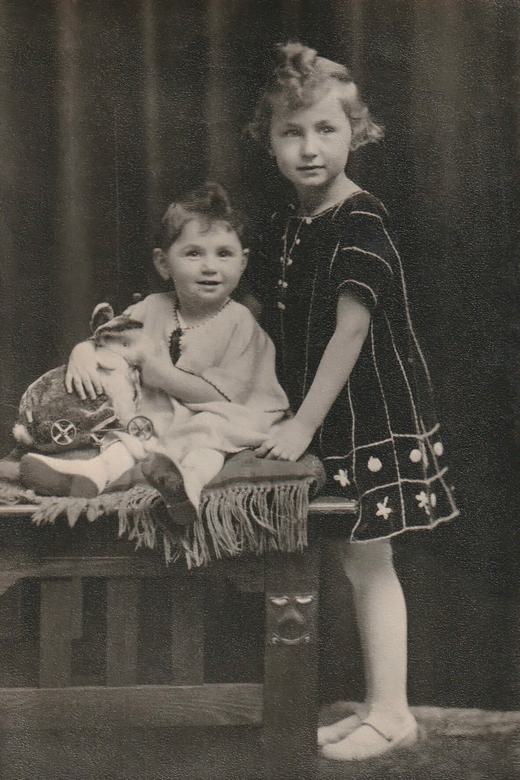
One-year-old Vera (left) with her sister, Stephanie. Germany, 1925.
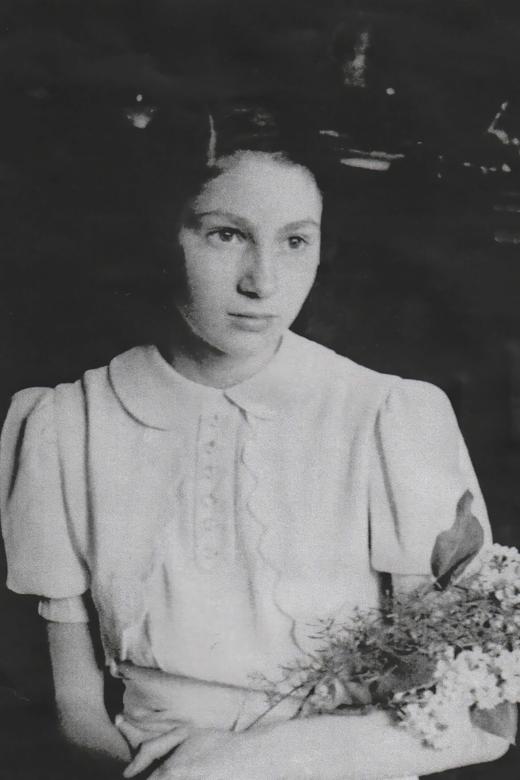
Vera at thirteen years old, on the occasion of her bat mitzvah in the Neue Synagoge. Breslau, Germany, 1938.
The Fires of Kristallnacht
On November 10, 1938, the day of Kristallnacht, I was on my way to school when I saw the synagogue was burning. So I went back home, and by that time we already knew that the windows had been broken in all the Jewish stores and that they were arresting Jewish men. We were living on Gartenstrasse and our garage was not right where we were living; it was somewhere else in the neighbourhood. On the morning of Kristallnacht, after my father saw what was going on, he said, “I’m going to get the car.” But he didn’t come back. He phoned my mother and said, “I’m not coming home. I’m going to drive to Lauban to see my relatives there and see what’s going on.” (Lauban is now known as Lubań and is in Poland.)
My father’s Rund cousins, his cousins from his mother’s side, had a handkerchief factory and offices in Lauban and lived in two apartments above the offices. Next to the front door was a sign with the name on it. As my father went into the building, he noticed that the sign was broken and just a little corner of it was still hanging. His cousins’ families were all at home and, of course, quite upset, and they didn’t want to go out. Lauban was a small town with only four Jewish families, and in such a small town everyone knows everyone. But they needed some shopping done and didn’t want to go, so they asked my father to do the shopping for them. While my father was gone, the men at home were arrested. So my father had escaped again. Had he been there, they would have taken him, too. Maybe at that time there was a guardian angel watching over him. When he came back, the women were all crying. He stayed there a couple of days and then came home. He phoned my mother first to see if anything had happened at home, but the Gestapo had not come for him. We think that my father might have been spared because he had been a soldier.
But the Gestapo did take my uncle Artur, my mother’s brother, who lived in Breslau. A few weeks after Kristallnacht, my father went back to Lauban, this time by train, and was to return home in the evening. It was quite late at night when he arrived at the railway station in Breslau, and all of a sudden he noticed somebody walking — it was my uncle Artur, who had just come back from a concentration camp (the Nazis released many of the Jewish men they had arrested during Kristallnacht around this time). My dad brought him home to our house and he stayed with us that night.
My sister, Steffi, had gone to England in October 1938, one month before Kristallnacht. On the day of Kristallnacht, my parents wrote her a letter telling her that they wanted to get out of Germany, that they had to get out and that she was their only hope. My parents sent me out to mail the letter.
After Kristallnacht, when people we knew came to our apartment, they rang the bell three times so that we knew it was one of our own, not the Gestapo, not the Nazis coming for my dad. In our apartment, there was a sliding door and then some stairs to get to the maid’s room. Any time someone we did not know came to the door, my father went up there to hide. It was a terrible way to live, but that’s how it was. When someone came to the door and didn’t ring the bell three times, we were afraid.
***
I left Berlin on a Kindertransport on July 25, 1939. I didn’t mind going because I hadn’t seen my sister for nine months and I was looking forward to seeing her. And knowing that I was going to see my sister helped me leave my parents. At the time it wasn’t that bad for me; but after I became a parent myself, I understood how that must have felt for my parents: it must have been terrible, unbelievable.
On my trip from Germany to England, the train stopped in the Netherlands. When the doors were opened, people came in to help us. They brought us goodies, and we started to sing. As young as we were, we knew that we were free.
All during the Hitler years, I think that most of the Jews still in Germany were hoping that one day things would change, and that Hitler would be gone. But after Kristallnacht, they knew that they had to get out. By that time, though, most of the countries had closed their doors and wouldn’t take any Jews.
My parents still tried to get out during the war. They tried to go to Shanghai and South America. If they needed to pay for visas, they had money outside the country, which was a big help.
The people my sister was working for in England lived in London, but the grandparents lived in Bournemouth, which was a seaside resort. At the time that I came to England, the family, with Steffi, was visiting the grandparents in Bournemouth. So instead of staying in London, I also went to Bournemouth. I stayed in a hostel there with other Jewish refugee children. Although I had been away from home on my own on several occasions, this was different. I was quite unhappy there and I remember times when I was crying. Before the war started, when my sister phoned my parents and told them that, they were quite surprised because they knew I had been away on my own before. But this was different.
War broke out on a Sunday morning. I was in the garden of the hostel, picking apples. When we got the news that war broke out, I started to cry because I must have known what that was going to mean: I wouldn’t see my parents again.
All during the Hitler years, I think that most of the Jews still in Germany were hoping that one day things would change, and that Hitler would be gone. But after Kristallnacht, they knew that they had to get out.
Enemy Aliens
In September 1939, after the war started, I went to a boarding school in Bournemouth as a pupil. The Jewish committee that ran the hostel made the arrangements for me at the boarding school. Because I couldn’t pay much for tuition (which was paid from my parents’ money), I had to help with the other children. I didn’t mind that but, again, I didn’t have the same rights as other children. I was already more or less like a black sheep in a family. First, in Germany, we were Jews, and now that we had come to England, although England saved our lives, we were again the underdogs because we were refugees, foreigners, Germans.
There were one or two other girls who were also from Germany and one of the rules in the school was that we were not allowed to speak German together. We had to speak English. In those days I did not speak very much English, so that was very hard. I was in a new country, with another language, all alone. It was not easy. And I was fifteen.
I didn’t like the boarding school at all. The children wore uniforms and of course we didn’t have money for me to buy a uniform; again, I was the odd one out. But the woman my sister worked for knitted a sweater for me in the school colours. So I had that and a tie.
The people where my sister worked did not go back to London after the war broke out — they had a little girl a year old and it was safer to stay in Bournemouth than to live in London. Steffi stayed in Bournemouth with them. On Saturday or Sunday, I would go and see Steffi, and that’s all that I lived for, just the weekend.
In May 1940, things looked very bad in England, as if the Germans would come and invade. So, as Germans, we had to leave the coast — all of us. The Jewish committee took us to Cambridge and because it was summertime we could stay on the university premises — this all had to be arranged quickly.
Steffi went back to London. While she was there, she was arrested as an enemy alien and put in Holloway Prison for one month. Later she was sent to an internment camp on the Isle of Man, where she was for a year and a half. I was spared because I was under eighteen.
In Cambridge we had to earn our keep. We went fruit picking for Chivas, a big fruit company. That was hard work. We stayed a year. First we were at the university, and then we went to private places, like boarding houses. In the morning, we were picked up by bus to go fruit picking on a farm. We did that all summer long. We had to hand over all our money except two shillings and fifty pence as pocket money. The Jewish committee took the money to pay for our stay at the boarding house. So, actually, we were paying for our own keep.
None of us was trained for anything. Then in the fall of that year, there was quite a demand in England for domestics. So the Jewish committee took us girls to a house in Cambridge — I don’t know whether they bought the house or rented it — and they brought in a teacher and we were taught domestic work. There were maybe twenty of us. We were taught how to clean, how to polish silver, how to do a bit of cooking. We were graded, and I made up my mind to do well. We were there about six months and I did do well; I came out on top.
After the training, we had to go into domestic work as a maid for one year. That was a must. I was with a family in Cambridge: there was a mother, a father, two little girls (one eight and one nine) and a grandmother. They had also taken in an air force officer who was stationed there. So we were seven people in the house. I was just seventeen. I did that for one year, working from seven o’clock in the morning until ten o’clock at night. I had a half-day off on Wednesday afternoons. I had to be back by 10:30 p.m. because of the curfew. And for that I was paid two pounds ten a month, which was enough money to buy a pair of shoes. I feel that I was taken advantage of, exploited. I did all this work for so little money.
We had a curfew in England because we were enemy aliens. The curfew was from 10:30 at night to 7:00 or 7:30 in the morning. We weren’t allowed to be out at night. Where I was working, the woman and the children had bicycles, and to take the children out on the bikes I had to have permission from the police to use a bicycle. Any move we made, we had to go to the police station with our registration book. Everything was entered into that book. If I changed jobs, I had to tell the police. If I moved, I had to go to the police station and report that I was moving to another address.
While I was in Cambridge and Steffi was in the internment camp, we communicated by letter. I could also keep in touch with my parents through the Red Cross. There was a form letter whereby we could send twenty-five words every three months to Germany via the Red Cross in Switzerland. Steffi was considered a prisoner of war and she could write directly to my parents. That was one advantage of her being interned. She could write directly to my parents and they could write directly to her. At some point, that stopped.
When Steffi came back from the internment camp, I went to see her in London. I was coming back a little after curfew and had to get permission to be out later than 10:30 p.m. Anything like that, we had to check in with the police. They kept track of us. They knew where we were. In England, we weren’t “the Jews,” — we were enemy aliens. It didn’t matter that we were Jewish. We were all lumped together as Germans.
Steffi had been in the internment camp on the Isle of Man from the fall of 1940 until February 1942. While she was in the internment camp, she had a baby, Yvonne, who was born on May 13, 1941. Yvonne was about nine months old when Steffi came out of the internment camp. She was released from the internment camp because by that time the British had realized that we were refugees, not enemy aliens. We were no danger to the country.
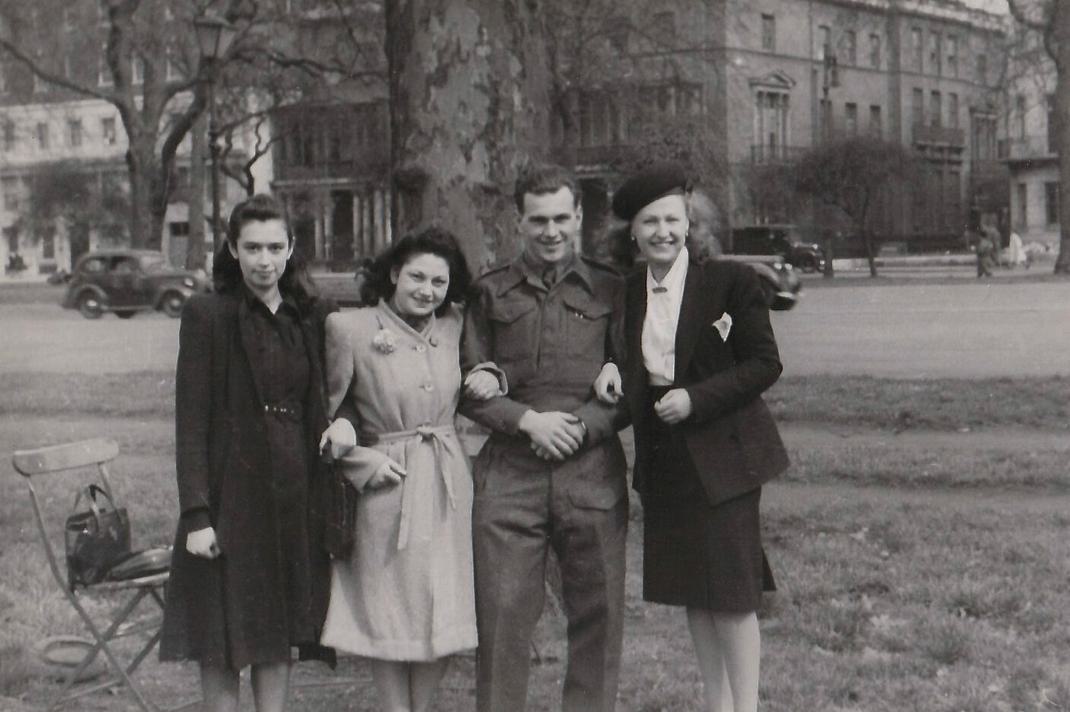
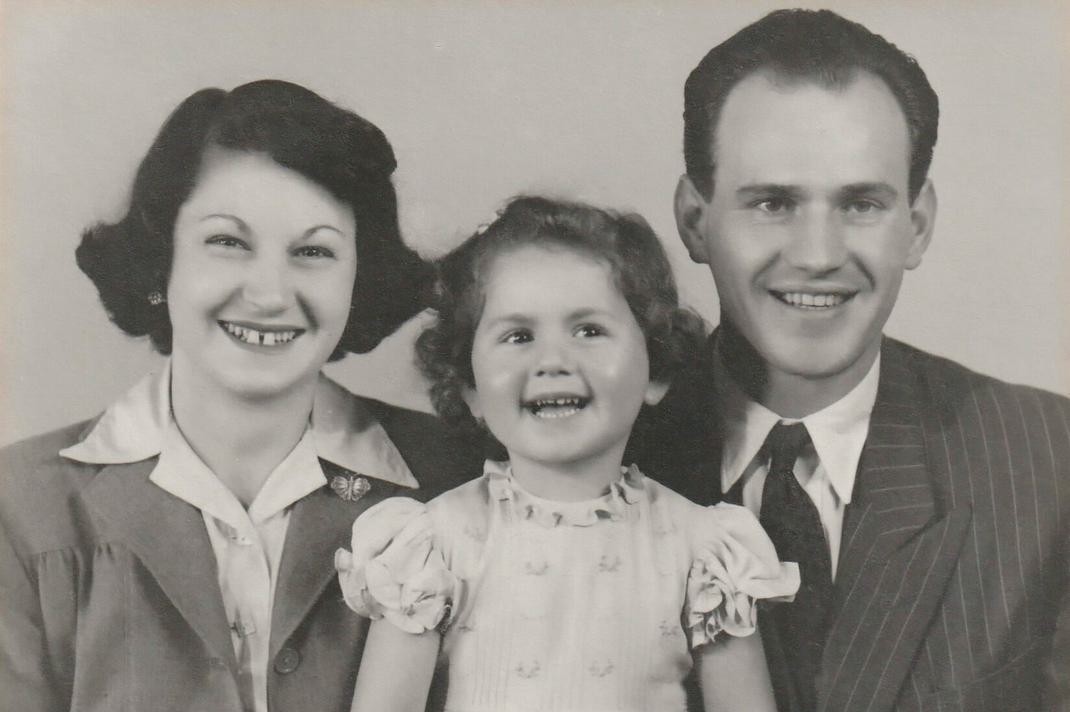
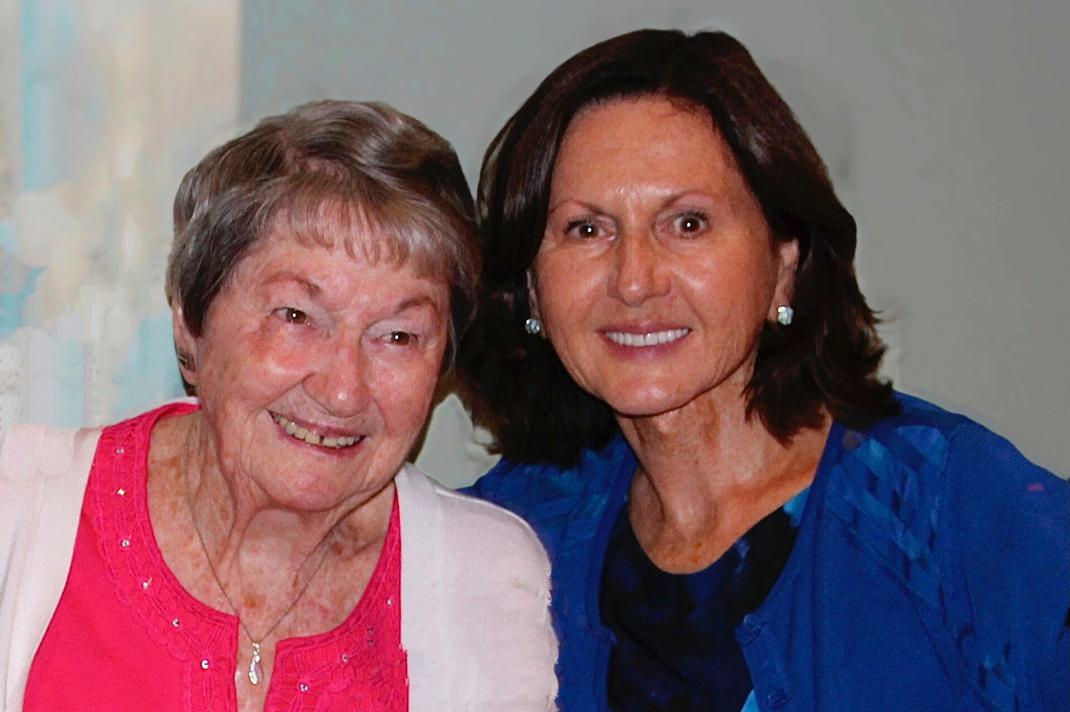
Reunions
In 1989, fifty years after we had left Germany, Austria and Czechoslovakia through the Kindertransport, some of us who had escaped as children decided to set up the Kindertransport Association, which organized a reunion in London. They thought about two hundred people might come. The word got around the world very quickly, and at that reunion we had about one thousand people.
At that reunion, after fifty years, I found one of my classmates. At each reunion, we received a special souvenir book that listed our names and addresses, as well as those of people who could not attend. I recognized the name of a boy who was in my class and had not attended the reunion. I followed up the lead and found that he lived in Los Angeles. At the next big reunion, which was in Jerusalem in 1994, we met in the hotel, fifty-five years after we had seen each other. We hugged and kissed each other.
We had another big reunion in London in 1999, sixty years after the Kindertransport. By this time I had found, after all those years, five of my classmates from Breslau as well as people that I knew from the hostel I lived in when I first came to England. For me this was a most wonderful occasion. Fred came with me to two of the reunions, and Margaret came with me to two of them. The last one, in 1999, the three of us attended together. My sister, Steffi, also attended the reunions in London. Being a photographer, Steffi helped with photos and researched the British archives to find them. When Steffi saw all these people who I had found after all those years, she was absolutely amazed. The reunions were wonderful, especially the one in Jerusalem.
After the first Kindertransport reunion in 1989, Toronto Kinder discovered one another and started a small Kindertransport group in Toronto. Unfortunately, that folded after ten years because the group got smaller. There is still a very large Kindertransport organization in the United States, and I’m a member there.
We have had very big milestones in our lives. We’ve kept up friendships with people we met when we were very young. None of us have had big families because most of us lost all of our families in the Holocaust. So those good friends became almost closer than our families.

